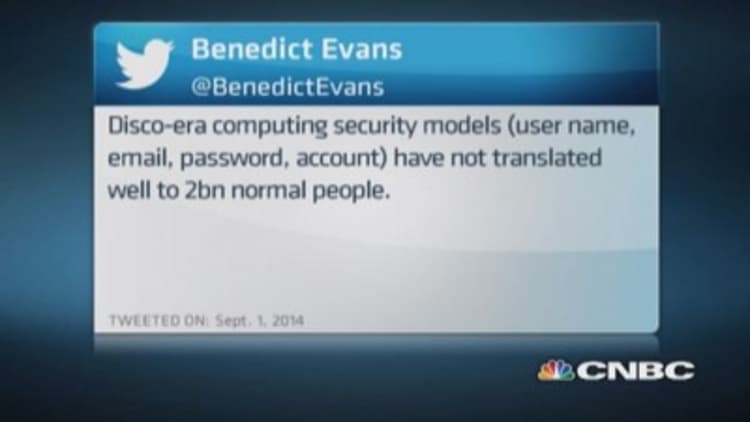Apple's plans for mobile payments may signal ambitions that go well beyond merely having your phone replace your wallet, analysts say.
Numerous reports over the summer said Apple's next phone—expected to be introduced next Tuesday—will include near field communication (NFC), a technology all but left for dead as recently as a few years ago.
Because NFC enables a touchless interaction between devices, many analysts think Apple's planning to make the iPhone the centerpiece of a mobile payment system. (CNBC content partner Re/code reported that Apple had struck a deal with American Express to be the payment vendor; it's also been reported that the vendor would be Visa.)
But Apple's plans with NFC likely go beyond payments—and beyond the phone, said John Haro, the chief technology officer at Vibes, a mobile marketing firm.
Read MoreTake profits in Apple now, says this analyst
"I think Apple will use NFC in a lot of other things they are doing. It's just a piece of what they are putting together in something that is heavily consumer-focused," Haro said.
For example: NFC in the iPhone could transform the device into a remote control for your home, said J.P. Growden, a vice president and senior analyst at Forrester. It could unlock doors and interact with other devices like appliances, consumer electronics and wearables, he said.
Last week, NXP Semiconductors, the NFC chipmaker that Apple has reportedly partnered with, said it released a new solution that allows people to use their NFC-enabled smartphone to control their other NFC-enabled devices.
"It will now become possible to use the highly intuitive [user interface] on your smartphone to program a washing machine, exchange data with an exercise bike or wristband, and download specific cooking recipes to your microwave oven," said Rutger Vrijen, NXP's vice president and general of tagging and infrastructure business in a statement posted on the company's website.
But the technology could also play a role in authenticating your identification, especially if Apple includes it in its rumored smartwatch.
Read MoreWhy the iPhone 6 will be bigger than people think
"There is a lot of potential here. It's not just them building a gadget, but building an ecosystem of value. You could make payments, check in for your doctor's appointment and possibly even use it in an airport to verify your identity with TSA," Gowden said.
"You could use a wearable as a way to navigate through the world."

'iWatch,' the real mobile payment solution?
Haro also sees NFC playing potentially a big role in Apple's rumored smartwatch, specifically when it comes to payments. Instead of tapping or placing your iPhone near a payment terminal, it makes more sense for the watch to be used as a payment device, he said.
Read MorePeople are already waiting in line for the next iPhone
"I think there's a high probability that they are going to launch the iWatch and I think that watch will be part of Apple's payment solution," Haro said. "Think about it, if your smartwatch and smartphone are tethered together, you may just be tapping your wrist or swiping your wrist over a payment terminal."
Haro pointed out that NFC isn't the only wireless technology that could make this solution possible.
"There's been so much focus on NFC specifically, but if you look at the patents they are really treating NFC as just one of the technologies involved," he said.
Read MoreCan Samsung challenge the iPhone 6?
Earlier this year Apple filed patents showing how multiple wireless technologies—including bluetooth, Wi-Fi and NFC—could all be used for mobile payments.
Apple already has a wireless capability on its phone called iBeacon, which is a Bluetooth Low Energy (BLE) technology that does basically the same thing as NFC. However because many Android devices now include NFC and retailers are increasingly adopting it into their payment terminals, Apple may finally be including the technology in its phone as a way to catch up.
Or Apple could have just been waiting for the right time to roll out the new tech, Haro said.
"They aren't famous for being first, they like to wait until the consumer market is ready and then they launch and take advantage of that," he said. "When they decide something is going to happen with that tech it tends to happen."
—By CNBC's Cadie Thompson


